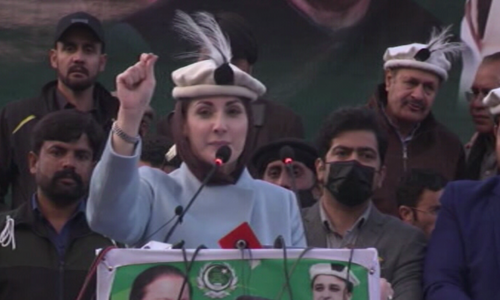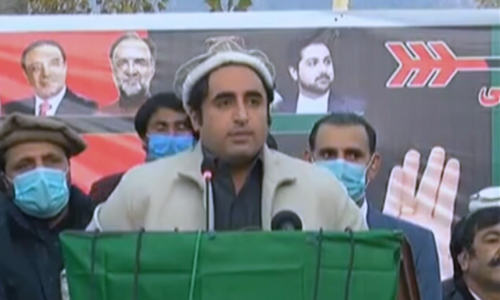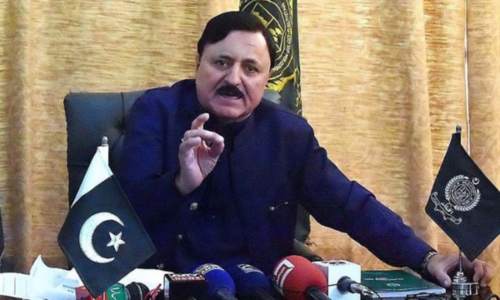• 51,109 women among 126,997 new voters registered since 2015
• Gender gap high in Diamer, Shigar, Nagar and Skardu districts
• Hunza only district with a drop in gender gap
ISLAMABAD: While the voters’ list for 2020 elections in Gilgit-Baltistan (GB) reflects the remarkable achievement of registering 126,997 new voters — a 21 per cent increase — since 2015, women’s representation has declined with the result that gender gap in the figures of registered voters has widened.
From the perspective of gender representation, the relatively higher number of men (75,888) compared to women (51,109) among the 126,997 newly registered voters indicated a slight increase in the overall gender gap from 7pc in the previous election to 9pc this year, according to Free and Fair Election Network (Fafen).
Fafen, which released its report titled “Women in Elections: Analysis of Registered Voters in GB” to the media on Sunday, found the highest gender gap of 10pc in Diamer division, followed by Baltistan division where gender gap rose to 8pc and Gilgit division where the 8pc gender gap remained unchanged.
The report pointed out “since the last elections in the region, as many as 126,997 voters have been added to the electoral roll. Compared to 618,364 registered voters on the 2015 electoral rolls, the number has increased to 745,361 voters reflecting an increase of 21pc.” Tracking the increase in the number of voters on the electoral rolls compared to the 2015 elections, there is a relatively similar trajectory across divisions and districts.
However, the trends across constituencies show significant variations ranging from 4pc in GBA-7 (Skardu-I) to 30pc in GBA-15 (Diamer-I).
At the division level, the highest increase in terms of number of registered voters is recorded in Gilgit with an increase of 55,053 voters, followed by Baltistan with an increase of 38,581 new voters and Diamer with 33,363 new voters. When assessed in percentage change, Diamer is leading with 22pc increase in the number of registered voters, followed by Gilgit (21pc) and Baltistan (18pc).
From the perspective of gender gap, the increase in registered voters reflect a slight increase in two of the divisions. With a disproportionate increase in the number of men, the 2020 electoral rolls for Diamer and Baltistan reflect an overall gender gap of 10pc and 8pc, respectively, whereas the gender gap did not change in Gilgit and remains consistent at 8pc.
While the number of registered voters increased in all the districts, the maximum increase is recorded in Diamer district where over 23,000 voters were added to the list and the least increase is witnessed in Kharmang district where only 4,911 additional voters were registered.
Overall, more than 20,000 new voters were registered in each of two districts, between 15,000 and 20,000 new voters were registered in each of two other districts.
Among the rest, two districts reflect an increase ranging between 10,000 and 15,000 while four districts show an increase of less than 10,000 in number of newly registered voters.
Gender gap drops in Hunza only According to the report, the increase in the number of registered voters reflects aproportionately higher number of men added to the voters list in all but three of the 10 districts.
Of these three, only Hunza district reflects a proportionately higher number of women getting registered for vote, as their percentage on the electoral roll slightly increased from 48pc in 2015 to 49pc in 2020.
Ghizer and Kharmang districts show a consistent gender gap of 8pc while the remaining seven districts have proportionately more men added to the list resulting in the widening gender gap.
It says the gender gap in voters’ list of four districts (Shigar, Nagar, Diamer and Skardu) refl ects a comparative increase of 4pc while the remaining three districts (Ghanche, Astore and Gilgit) have a comparative increase of 2pc.
As with the division and district level trends, the number of registered voters, when compared with 2015 elections, reflects universal yet varying increase. The variance in the number of new voters to the constituency-wise list ranges from as low as 643 new voters in Skardu-I (GBA-7) to 8,133 in Ghizer-II (GBA-20). The trend at the constituency level shows over 20pc increase in registered voters of 11 constituencies and between 15pc and 20pc in 12 other constituencies, while only one constituency records less than 5pc increase in new voters. Among the new voters, in all but two constituencies, a disproportionately higher
number of men were registered. Only in one constituency, GBA-6 Hunza, the percentage increase in female voters exceeds the percentage increase in male voters (22pc increase in women compared to 19pc increase in men), as in the other GBA-7 Skardu constituency, the percentage of increase in men and women voters remained the same at 4pc.
Among the 22 remaining constituencies, the percentage of men voters in the new additions to the voters list outdid the entries of women voters by a margin ranging between one percentage point to 20 percentage points.
The disproportionately higher number of men added to the voters’ list increased the gender gap in 20 of the 24 constituencies. Of these 20 constituencies, gender gap increased by two percentage points in 12 constituencies, four percentage points in five constituencies and six percentage points in the remaining three constituencies.
The gender gap decreased in only one constituency, while it remained consistent in the remaining three constituencies.
At present 17 constituencies have a gender gap ranging between 5pc and 10pc while only three constituencies have less than 5pc gender gap.
Out of 745,361 voters on the 2020 Gilgit-Baltistan voters’ list, 339,998 (46%) are women. The figures reflect as many as 65,365 more men registered compared to women. The figures, according to Fafen, are not ideal but once contextualised, reflect an encouraging picture of a region that is predominantly rural with significant environmental and infrastructure challenges that inhibit access to and provision of key public services, including the provision of national identity cards, a primary requirement for registration on the electoral roll since the 2015 elections in the region.
“In the post-election phase, the issue of a representative voters’ list shall be pursued as a cause of common concern by all relevant stakeholders, especially the Election Commission of GB,” Fafen expects.
Starting with the four constituencies where the gender gap exceeds the legally defined threshold of 10 percentage points, there is a need for a proactive approach to ensure registration of eligible-age women at a level that establishes the balance among registered voters across genders.
The template for cooperation and coordination among the stakeholders with specific goal of increasing women representation in the voters’ list, as implemented in Pakistan, may be replicated in the region. Where the variation in the disaggregated data under sub-section (1) is more than 10pc in a constituency, the Commission shall take special measures to reduce such variation under Section 47(2) of the Election Act, 2017.
Published in Dawn, November 9th, 2020














































